IFIC: little confusion over plant-based dairy
16 Oct 2018A new survey by the International Food Information Council (IFIC) Foundation shows a low level of consumer confusion over nomenclature and basic differences between dairy and non-dairy.

As the U.S. Food and Drug Administration considers a proposal “to provide greater clarity on appropriate labeling of plant-based alternatives” to milk and dairy products, a new survey by the International Food Information Council (IFIC) Foundation shows a low level of consumer confusion over nomenclature and basic differences between the two.
According to the survey, about three-quarters of Americans understand that plant-based “milk” products do not actually contain cow’s milk (75% for soymilk and almond milk, 74% for coconut milk, 73% for rice milk and 72% for cashew milk). Fewer than 10% believe that any of those products contains cow’s milk, while the remainder say they don’t know (20%for cashew milk and rice milk, 18% for coconut milk, and 16% for soymilk and almond milk).Conversely, large majorities know that products labeled “whole milk” (90%), “chocolate milk” (85%), “nonfat milk” (78%) and “skim milk” (74%) contain cow’s milk, although that number falls to 48% for “lactose-free milk.”Consumers expressed similar awareness about whether various products labeled as milks or butters contained cow’s milk or plant-based ingredients. Cow’s milk was identified as an ingredient in chocolate milk by 84% of respondents, in organic milk by 78% and in butter by 77%, with only 8% or less believing that any of them contains plant-based ingredients. For lactose-free milk, 62% believe it contains cow’s milk and 14% cite plant-based ingredients.The survey also asked about consumers’ purchases in the past three months. Nearly half (45%) bought 2% milk, with 38% for whole milk, 30% for almond milk, 29% for chocolate milk, 19% for 1% milk, 16% for both skim milk and soymilk, and less than 10% for lactose-free milk or other nut- or grain-based milks.Of those who buy products marketed as milks, 62% purchase solely dairy, while 38%purchase non-dairy. Groups who are more likely than others to buy non-dairy products include people in the western United States (45%), consumers under 45 years old (43%), people of color (48%, compared to 32% of white people) and those with a college education (44%, compared to 30% of non-college graduates).Related news
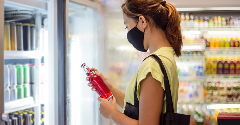
Asian beverage brands deal with rising costs
4 Jan 2023
Decreasing bottle sizes or increasing prices? Asian beverage brands are finding “creative approaches” to manage rising costs, according to industry analysts.
Read more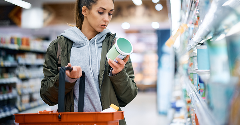
Value-seeking US consumers cut back on food spending
2 Jan 2023
Cheaper items, smaller sizes, and shorter grocery lists: inflationary effects coupled with a global long-term recession are set to continue shaping food spending habits, according to a recent Rabobank report.
Read more
Opportunities grow for lower-caffeine coffee
23 Dec 2022
Many consumers want the mental focus of caffeine without the jitters, prompting a wave of product development such as “half caffeine” ground coffee or ready-to-drink (RTD) cold brew blended with relaxing botanicals.
Read more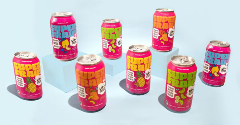
Superfrau upcycles liquid whey for energy drinks
22 Dec 2022
US company Superfrau turns surplus whey into sustainable, upcycled-certified dairy products for the recovery drinks market.
Read more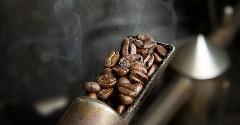
Swedish food agency: One in 10 coffee brands contain excess acrylamide
7 Dec 2022
New findings from the Swedish Food Agency have revealed three of 29 coffee products sampled contained acrylamide above limits, reinforcing the link between levels and degree of roasting.
Read more
Editor’s choice: Our roundup of the latest women’s health products around the world
2 Dec 2022
From botanicals to combat menopause symptoms to a hydration powder for mothers-to-be, here is our roundup of the most innovative new product launches within women’s health.
Read more
The prize no brand wants to win: 2022’s most misleading products
28 Nov 2022
Food industry watchdog Foodwatch is asking consumers to vote for 2022’s most misleading product. A high-sugar vitamin water and “artisan” salad made with artificial additives are among the nominees.
Read more
enduracarb®: A science-backed trehalose ingredient for athletic endurance
24 Nov 2022
enduracarb® is a science-backed, slow-acting carbohydrate that can power athletes’ performance. Produced using a high-purity production process, it is suitable for a wide variety of applications.
Read more
China bans celebrity endorsement of health and formula foods
22 Nov 2022
China is to ban celebrity endorsement or advertising of certain products, completely banning high profile figures with “lapsed morals” as the country attempts to drive society towards “core socialist values”.
Read more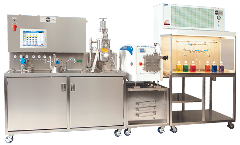
MicroThermics’ Formulators Guide to Process Selection for Plant-Based Beverages
15 Nov 2022
Plant-based beverages & products are mainstream! Come to FIE booth 4D122 & read our whitepaper to see how processing in the lab at commercial HTST & UHT conditions gets you to market faster for less!
Read more